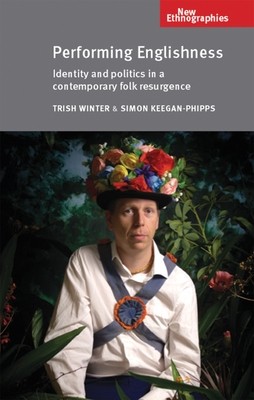
- We will send in 10–14 business days.
- Author: Trish Winter
- Publisher: Manchester University Press
- ISBN-10: 0719097304
- ISBN-13: 9780719097300
- Format: 15.6 x 23.4 x 1.1 cm, softcover
- Language: English
- SAVE -10% with code: EXTRA
Reviews
Description
Performing Englishness looks in detail at the growth in popularity and profile of the English folk arts in the first decade of the twenty-first century. Based on original research within English folk culture, it is the only ethnographic study of its kind. By closely scrutinising various facets of this folk resurgence - discursive, musical and visual - the authors explore how it speaks to a broader explosion of interest in the subject of English national and cultural identity.
How does contemporary English folk music and dance relate to ideas about England and Englishness? What kinds of English identities are expressed through the works of musicians like Seth Lakeman or Bellowhead? How does morris dancing contribute to ongoing political debates around multiculturalism, globalisation, and the devolution of the British nations? And how does the English folk scene reconcile a new-found commercial success with anti-capitalist roots? In their quest for answers to these and other questions, the authors combine the approaches of British cultural studies and ethnomusicology, drawing on ethnographic fieldwork, interviews with central figures of the resurgence and close analysis of key musical and dance texts. Their presentation of the English case contributes to debates about English identity and calls for a rethinking of concepts such as revival, indigeneity and tradition. It will be of interest to students and scholars in the field of cultural studies, ethnomusicology and related disciplines.EXTRA 10 % discount with code: EXTRA
The promotion ends in 11d.19:44:01
The discount code is valid when purchasing from 10 €. Discounts do not stack.
- Author: Trish Winter
- Publisher: Manchester University Press
- ISBN-10: 0719097304
- ISBN-13: 9780719097300
- Format: 15.6 x 23.4 x 1.1 cm, softcover
- Language: English English
Performing Englishness looks in detail at the growth in popularity and profile of the English folk arts in the first decade of the twenty-first century. Based on original research within English folk culture, it is the only ethnographic study of its kind. By closely scrutinising various facets of this folk resurgence - discursive, musical and visual - the authors explore how it speaks to a broader explosion of interest in the subject of English national and cultural identity.
How does contemporary English folk music and dance relate to ideas about England and Englishness? What kinds of English identities are expressed through the works of musicians like Seth Lakeman or Bellowhead? How does morris dancing contribute to ongoing political debates around multiculturalism, globalisation, and the devolution of the British nations? And how does the English folk scene reconcile a new-found commercial success with anti-capitalist roots? In their quest for answers to these and other questions, the authors combine the approaches of British cultural studies and ethnomusicology, drawing on ethnographic fieldwork, interviews with central figures of the resurgence and close analysis of key musical and dance texts. Their presentation of the English case contributes to debates about English identity and calls for a rethinking of concepts such as revival, indigeneity and tradition. It will be of interest to students and scholars in the field of cultural studies, ethnomusicology and related disciplines.

Reviews